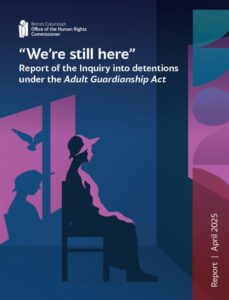 The BC Human Rights Commissioner recently released a report of their Inquiry into detentions under Part 3 of BC’s Adult Guardianship Act (AGA). The AGA allows designated agencies such as health authorities and Community Living BC to provide emergency assistance to adults who appear to be abused and neglected and who are apparently incapable of giving or refusing consent. However, the law is unclear about the extent of these emergency powers.
The BC Human Rights Commissioner recently released a report of their Inquiry into detentions under Part 3 of BC’s Adult Guardianship Act (AGA). The AGA allows designated agencies such as health authorities and Community Living BC to provide emergency assistance to adults who appear to be abused and neglected and who are apparently incapable of giving or refusing consent. However, the law is unclear about the extent of these emergency powers.
The report’s findings include: a lack of transparency in the process – information on how this law is administered is often restricted from legal representatives and legal counsel of the adult; there are a lack of safeguards for s. 59 AGA detentions both in law and practice; and some detentions are being made without legal authority. These detention practices have a disproportionate impact on seniors and persons with disabilities.
Nidus agrees with the Commissioner’s statement that health and social service providers must respect a representative’s decision made under the authority of a Representation Agreement as if it was the adult’s decision, and that health care providers should not ignore a representative’s instructions because they don’t like or don’t agree with the representative’s answer, unless the decision will cause the adult harm – with a caveat that as acknowledged in s. 45(2)(b) of the AGA, this does not prevent an adult’s representative or guardian from refusing health care for the adult in accordance with wishes the adult expressed while capable, even if the refusal will result in the adult’s death.
Nidus supports the Commissioner’s recommendations 4 and 6, which call for government in consultation with the public and community-based organizations to: develop provincial regulations, policies, or guidelines which include standards for ensuring that an adult’s representative is immediately informed of their detention and the adult’s whereabouts; and to develop mandatory provincial training for all those who exercise decision making authority under Part 3 of the AGA, which includes training on statutory frameworks for decision making, such as the Representation Agreement Act.
BC’s Representation Agreement Act is world-renowned, having been acknowledged as the best policy in the world for recognizing the right to support in personal decision making and for avoiding adult guardianship. It is an effective legal model for decision making that embodies the principles of the right to full person-hood, self-determination, and support as needed. It is consistent with the UN Convention on the Rights of Persons with Disabilities, which calls on State Parties to allow persons with disabilities the support they may require to exercise their legal capacity. Nidus is the only community-based organization in BC and Canada devoted to personal planning and Representation Agreements.
